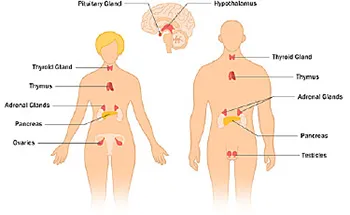What Is the Endocrine System?
Your endocrine system includes all the glands in your body that make hormones. These chemical messengers play a key role in making sure your body works the way it should.
If your endocrine system isn't healthy, you might have problems developing during puberty, getting pregnant, or managing stress. You also might gain weight easily, have weak bones, or lack energy because too much sugar stays in your blood instead of moving into your cells where it's needed for energy.
Key Parts
 Many different glands make up the endocrine system. The hypothalamus, pituitary gland, and pineal gland are your brain. The thyroid and parathyroid glands are in your neck. The thymus is between your lungs, the adrenals are on top of your kidneys, and the pancreas is behind your stomach. Your ovaries (if you're a woman) or testes (if you're a man) are in your pelvic region.
Many different glands make up the endocrine system. The hypothalamus, pituitary gland, and pineal gland are your brain. The thyroid and parathyroid glands are in your neck. The thymus is between your lungs, the adrenals are on top of your kidneys, and the pancreas is behind your stomach. Your ovaries (if you're a woman) or testes (if you're a man) are in your pelvic region.
Hypothalamus: This organ connects your endocrine system with your nervous system. Its main job is to tell your pituitary gland to start or stop making hormones.
Pituitary: This is the "master" gland of your endocrine system. It uses information it gets from your brain to "tell" other glands in your body what to do. It makes many different important hormones, including growth hormone; prolactin, which helps breastfeeding moms make milk; and luteinizing hormone, which manages estrogen in women and testosterone in men.
Pineal: This gland makes a chemical called melatonin. It helps your body get ready to go to sleep.
Thyroid: This gland makes thyroid hormone, which controls your metabolism. If this gland doesn't make enough (a condition called hypothyroidism), everything happens more slowly. Your heart rate might slow down. You could get constipated. And you might gain weight. If it makes too much (hyperthyroidism), everything speeds up. Your heart might race. You could have diarrhea. And you might lose weight without trying.
Parathyroid: This is a set of four small glands behind your thyroid. They are important for bone health. The glands control your levels of calcium and phosphorus.
Thymus: This gland makes white blood cells called T-lymphocytes that fight infection and are crucial as a child's immune system develops. The thymus starts to shrink after puberty.
Adrenals: Best known for making the "fight or flight" hormone adrenaline (epinephrine), these two glands also make corticosteroids. These are hormones that affect your metabolism and sexual function, among other things.
Pancreas: The pancreas is part of both your digestive and endocrine systems. It makes digestive enzymes that break down food. It also makes the hormones insulin and glucagon. These help ensure you have the right amount of sugar in your bloodstream and your cells.
If you don't make any insulin, which is the case for people with type 1 diabetes, your blood sugar levels can get dangerously high. In type 2 diabetes, the pancreas usually makes some insulin but not enough.
No comments:
Post a Comment